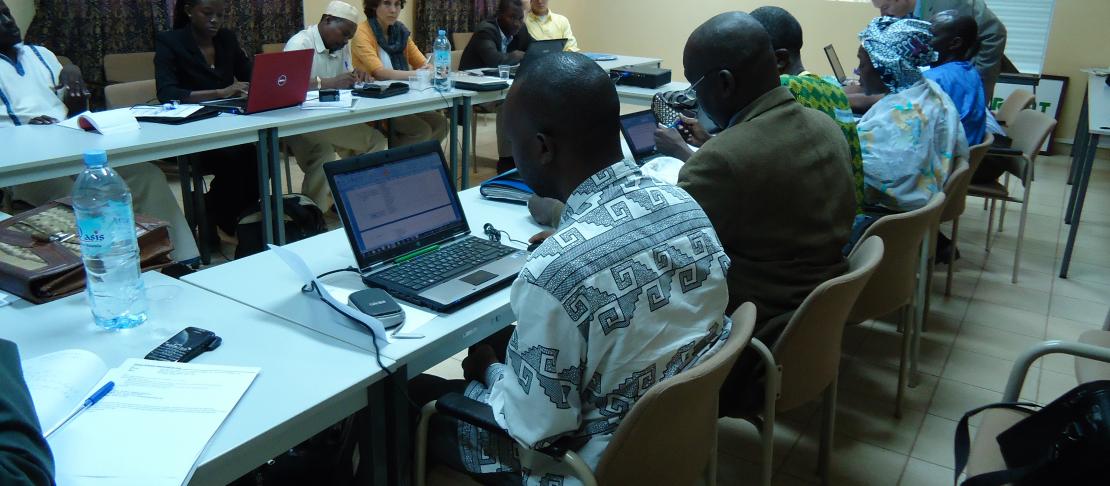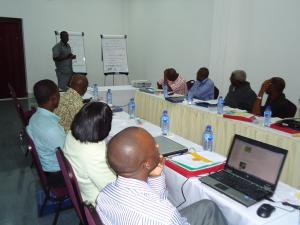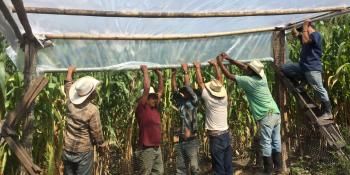National Workshops To Support Climate Change Policy in Agriculture

Guest blog by Lini Wollenberg, Theme Leader for theme 'Pro-poor Climate Change Mitigation' and Chase Sova, visiting researcher on 'Adaptive Capacity under Progressive Climate Change', CCAFS.
Representatives from government agencies, research institutes, development organizations and civil society came together in June and July to discuss the current status of climate change policy in agriculture and identify research priorities in each of four countries: Ghana, Mali, Kenya and Ethiopia. CCAFS organized the national workshops respectively with the Council for Scientific and Industrial Research (CSIR) in Ghana, the International Crops Research Institute for the Semi-Arid Tropics (ICRISAT) in Mali, the Tegemeo Institute in Kenya and the Climate Change Forum in Ethiopia.
In each meeting, national organizations provided an overview of the status of climate change adaptation and mitigation. Participants then identified knowledge and policy gaps and research priorities to address them. A number of common priorities emerged in the discussion among the four countries. We suspect other countries in the region may share similar needs. The priorities include:
Foundational needs
Decision makers in each country wanted better information with which to prepare for climate change and support more climate friendly agriculture.
- Basic data to enable prediction of climate, GHG emissions, impacts
- Digitizing, cleaning and centralization of existing climate data
- Baselines and inventory of existing practices
- Documentation of local knowledge and indigenous varietals
- Potential of agriculture for adaptation and mitigation
- Priority sectors or interventions for green development
- Greenhouse gas emission reduction targets
- Tools for measuring GHG emissions and soil carbon
- Food security, adaptation and mitigation indicators to assist monitoring
- Identifying incentives for action: adaptation and mitigation
- Decision support tools
Policy Priorities
In each country, participants prioritized actions that would lead to rapid implementation of climate smart agriculture.
- Mainstream climate change into development planning and budget and university curriculum
- Build on existing knowledge and projects: put existing technologies in to wider practice
- Enhance intersectoral, multiscale communication, negotiation and coordination
Big Policy Questions
Participants recognized that basic assumptions about the forces driving climate change and its impacts as well as how to change behavior to reduce climate change required significant research attention.
- What are drivers of climate change and how to influence them? Separate effects of climate change from other drivers of poverty, food insecurity and emissions.
- Economic implications of options to support climate change adaptation and mitigation?
How to change attitudes and behavior?

While there were many shared research priorities between the countries, each workshop also resulted in discussion of themes specific to that county. These themes included:
Ghana: Improving climate change information and policy dissemination from national to local level, including general awareness campaigns
Mali: Encouraging the integration of indigenous knowledge in to national climate change dialogue and the documentation of existing local resources
Kenya: Assessing the level of national climate change policy coordination between ministries (with particular focus on the implementation of the 2010 constitution) and the need for scientific and economic analysis of adaptation and mitigation options to support decision making
Ethiopia: Improving links between science and policy through the implementation and review of available adaptation and mitigation options
It should be noted that these differences among countries may reflect more the course of discussion and participants' interests rather than true differences of priorities at the national level.
The workshops concluded with plans for collaborative research on many of these issues. CCAFS will play an active role in fostering partnerships through national and regional channels while continuing to promote research initiatives that contribute towards filling these important gaps. Reviews of national policies and programs in the four countries are underway as complement to the workshop activities and are expected to be completed shortly.
See also blogpost by Priti Naramsimhan 'In the field: Assessing Options for Pro-Poor Climate Mitigation' for more information on this theme.


